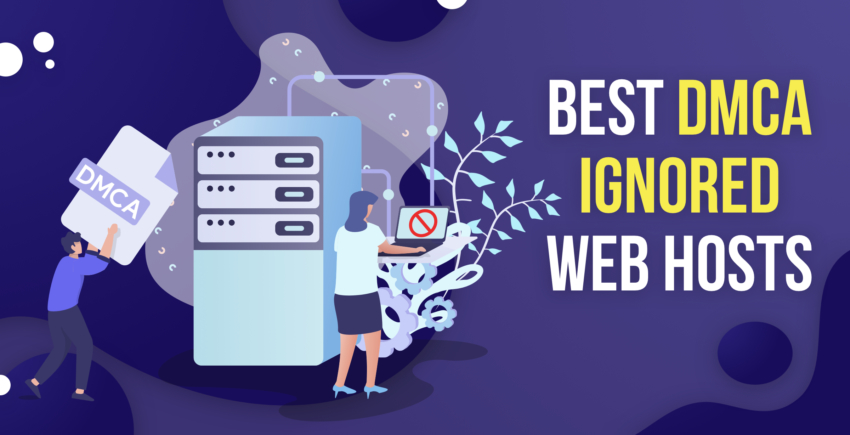Protecting Your Content with DMCA Ignored Hosting: Discover the Best Options for Secure Online Presence

With countless websites and platforms out there, it can feel like an uphill battle to safeguard your hard work from being stolen or misused. That’s where DMCA ignored hosting comes in – a powerful tool that allows you to take control of your online presence and ensure your content remains safe and secure. In this blog post, we’ll explore the benefits of DMCA ignored hosting, factors to consider when choosing a provider, and how you can set up and utilize this invaluable resource.
Benefits of DMCA Ignored Hosting for Content Protection
When it comes to protecting your content, DMCA ignored hosting offers a multitude of benefits. First and foremost, it provides an extra layer of security that is specifically designed for content creators and website owners. With regular hosting services, you may encounter instances where your content is wrongfully flagged or taken down due to false copyright claims. However, with DMCA ignored hosting, you can rest assured knowing that your content will be protected from such unwarranted actions.
Another advantage of DMCA ignored hosting is the freedom it grants you in terms of what you can publish on your website. Traditional hosting providers often have strict policies regarding certain types of content which may limit your creativity or ability to express yourself fully. But with DMCA ignored hosting, those restrictions are lifted, giving you the flexibility to share any type of content without fear of censorship.
Additionally, DMCA ignored hosting ensures that your website remains online even if someone files a complaint against your content. This means uninterrupted access for visitors and customers who rely on your site for information or products/services. It also helps maintain a positive user experience by preventing downtime caused by takedown requests.
Factors to Consider When Choosing a DMCA Ignored Hosting Provider
1. Reputation and Reliability: One of the key factors to consider when choosing a DMCA ignored hosting provider is their reputation and reliability. Look for providers that have a strong track record in providing secure hosting services and have positive reviews from other users.
2. Server Location: The location of the server can also play a role in your decision-making process. If you want to target specific geographical regions, it’s important to choose a hosting provider with servers located in those areas. This can help improve website loading speed and overall user experience.
3. Bandwidth and Storage: Assessing your website’s needs for bandwidth and storage is crucial when selecting a DMCA ignored hosting provider. Make sure they offer sufficient resources that can accommodate your content without any restrictions or additional charges.
4. Security Measures: Content protection should be one of your top priorities, so ensure that the hosting provider offers robust security measures such as SSL certificates, firewalls, regular backups, and DDoS protection.
5. Customer Support: A reliable customer support team can make all the difference during any technical difficulties or issues you may encounter with your website. Look for providers that offer 24/7 support through various channels like live chat, email, or phone.
6. Scalability Options: As your online presence grows, you may need to scale up your resources accordingly. Therefore, it’s essential to choose a DMCA ignored hosting provider that allows easy scalability options without causing major disruptions to your website’s performance.
How to Set Up and Use DMCA Ignored Hosting
In this article, we’ve explored the benefits of DMCA ignored hosting for content protection and discussed important factors to consider when choosing a provider. Now, let’s dive into how you can set up and use DMCA ignored hosting to safeguard your online presence.
1. Research and select a reputable provider: Start by researching different providers that offer DMCA ignored hosting services. Look for reviews, customer testimonials, and compare their features and pricing plans. Choose a provider that aligns with your specific needs and requirements.
2. Sign up for an account: Once you have selected a suitable provider, visit their website and sign up for an account. You may need to provide some personal information during the registration process.
3. Choose your hosting plan: Most DMCA ignored hosting providers offer various plans based on storage capacity, bandwidth limits, server locations, etc. Select the plan that best suits your content needs.
4. Set up your domain: After signing up for an account, you will be prompted to set up your domain name or transfer an existing one if applicable. Follow the instructions provided by the hosting provider to complete this step successfully.
5. Install Content Management System (CMS): Depending on your website requirements, you may want to install a CMS like WordPress or Joomla through the hosting control panel or using one-click installation options offered by most providers.
6. Configure security settings: Once you have installed CMS software on your domain, it’s crucial to configure security settings properly. This includes setting strong passwords for admin accounts and enabling additional security measures such as firewall protection and SSL certificates if available.
7. Upload content securely: With everything set up correctly, it’s time to start uploading your valuable content onto the server provided by DMCA ignored hosting service provider. Make sure all files are properly labeled and organized so that they can easily be located in case of any issues with copyright claims
8. Regularly monitor activity logs : It is essential to regularly monitor the activity logs provided by your hosting provider. This will help you stay informed about
















